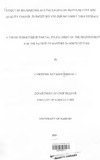| dc.description.abstract | This study was carried out to determine the effect of recharging and packaging on
the shelf life of sweet potato roots during short-term storage. Freshly harvested potatoes
from five genotypes were recharged by immersing in tap water for 0, 7 and 14 hours and
thereafter evaluated for weight gain or loss, relative solute leakage, total soluble solids
and dry matter content for 18 days.
Recharging led to significant weight gain, decreased weight loss and decrease in
relative solute leakage in all the genotypes. However, recharging did not have significant
effects on total soluble solids at the end of storage. Significant linear and/or quadratic
effects on recharging duration treaments were observed in weight gain, weight loss,
relative solute leakage and total soluble solids. The beneficial effect of recharging sweet
potato was, therefore, due to replacement of lost moisture and decrease in moisture loss during storage following recharging. Recharging for 14h would be adequate to gain
sufficient extension of shelf-life of sweet potato roots.
The effect of packaging on moisture loss and nutrient quality of two genotypes of
sweet potato was also determined. Each of two genotypes, 'KEMB 10' and 'Yanshu"
were recharged for 14 hours and packaged in kraft paper bag, perforated polythene bag
and nylon gunny sack. The packaged potatoes were then stored at ambient conditions,
with roots placed on an open plate as controls. During storage the potatoes were analysed for weight change, loss in reduced ascorbic acid, beta-carotene contents, total sugars and total soluble solids.
Packaging significantly decreased weight loss as well as reduced ascorbic acid
and increased nutrient retention. Perforated polythene bag-packaged sweet potato roots
exhibited the highest decrease in these losses compared to the roots in other packages and in no package (control). Beta-carotene and total sugars increased during storage, with perforated polythene bag-packaged sweet potato roots having the highest values.
However, packaging had no significant effects on total soluble soild content of the roots.
Results of these studies show that recharging as well as packaging can be
employed to improve the shelf-life of sweet potato. Recharging for 14h and packaging
in perforated polythene bags can be recommended as the best combination of treatments to be applied in attempting to extend the shelf-life of sweet potato. | en |

